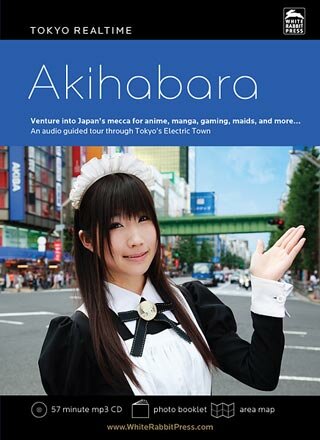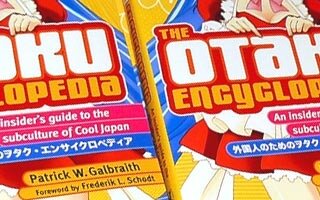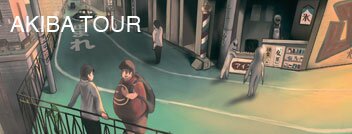 Filed under: Anime
Filed under: Anime'Summer Wars' review
14.08.2009 by Patrick W. Galbraith
This and the second "Evangelion" were the two films I was looking forward to this summer, but I was preoccupied with research and watched "Summer Wars" a week after it opened. Even so, the theater in Shinjuku was sold out when I tried Monday night, and again on Tuesday afternoon, a testament to the quality and wide appeal of this work. It is from Hosoda Mamoru, the director of which won many awards, including Japan Academy Prize for Animation of the Year 2006. As with that film and "Eva," Sadamoto Yoshiyuki did the character designs for "Summer Wars."
The story is about Kenji, a high school student who works part time maintaining a virtual online world called Oz. Basically the entire world is using Oz to function from e-mail and GPS to banking and weapons defense systems. Kenji is crushing on a girl, Natsuki, who invites him to work part time in the countryside over the summer. The job, Kenji finds, is to act like Natsuki's fiancé to please the family matriarch, who will be turning 90. Just as Kenji is starting to get into it, he solves a strange mathematical puzzle that arrives to his cell phone. This turns to be the security code for Oz, and once it is cracked a mega A.I. virus called Love Machine starts unleashing hell on Oz, enslaving other avatars and using the online infrastructure to throw the real world into utter chaos. Natsuki's grandmother dies, but the family comes together to reconcile and defeat the virus. Natsuki uses her avatar to gamble at hanafuda cards and win accounts back from the now monstrous Love Machine, which weakens him enough so that her cousin "King" Kazuma can lay the smack down. Kenji cracks the security code and redirects a missile headed for the house - with the help of Wabisuke, the black sheep of the family who went to America and programmed Love Machine to prove he wasn't a screw up. Admittedly, it is a bit of a stretch that all these talented folks are under the same roof, but you just have to suspend disbelief.
As mentioned, the film is visually very satisfying. It opens on a black screen with layered voices in Japanese and English explaining Oz, then a cell phone appears and the audience is granted access to the virtual land over the rainbow. It looks like a Murakami Takashi painting, specifically from early 2000s when he collaborated with Louis Vuitton and had an installation at Roppongi Hills. The world is white with colorful accents, and is dominated by a giant tower-like creature in the middle and inhabited by cutesy avatars. But what reminded me most of Murakami was the flatness, or slick, polished surfaces of this world. In great contrast is the physical setting, Ueda-shi, Nagano Prefecture. Hosoda's wife is from the area, and the director apparently was quite taken with the image of traditional Japan. It has a warm and lived in feel to it, aided by a scrupulous attention to detail. As Kenji and Natsuki make their way to the countryside (first a bullet train, then local train and local bus) there is a subtle transformation of their surroundings, captured in shocking realism. The views of Natsuki's family estate, a grand old Japanese home, are amazing. Then there is the scenery. Even now some of the images are fresh in my mind: white clouds moving across a blue sky, flowers blooming in the night, the sun rising.
In the end what really stood out about this fill was the pictures. Not the fluid movement of a big budget animated film or the blistering fight scenes one would expect of studio Madhouse, but these warm images of family, home and the not so distant past. Scenes such as the large family coming together and talking over dinner are heartwarming and hilarious. At one point, an older fellow asks Kenji if he has "done it" with Natsuki, who has told everyone that the boy is in fact an adult who has attended University of Tokyo and lived abroad. Hosoda's message seems to be that communication and contact are the keys to happiness. One of the tenants of Oz heard in the opening moments of the film is "communication," but this digital, technological communication turns out to betray. An old woman, the family matriarch, overcomes this using a rotary phone to call up old friends and acquaintances during the darkest hours of Love Machine's terrorism. As she talks on the phone, Hosoda shows the audience images of old letters, browned and crinkled envelops, photographs worn and frayed from loving attention. Kenji and Natsuki say it for us, "She is amazing." The death of grandma solidifies the family, too, and they go after Love Machine with a vengeance. This includes his creator, Wabisuke, an asshole, but one that loved the old lady, who adopted him as a child knowing he was her husband's bastard. A particularly poignant flashback is grandma walking with the child Wabisuke hand and hand down a country road; we see them from behind walking away from us. This isn't just a simple rejection of digital communication, though. A few great scenes have all the members of the family of all ages using computers, cell phones, Nintendo DS units and so on to access Oz and fight together. This isn't just about a breakdown between "the virtual" and "reality," but rather a nuanced commentary on how the virtual can affect us.
In all, I would say "Summer Wars" is a moving picture book, a family photo album turned back a few decades. The vibe is really Showa Era Japan, the good old days. There are kids everywhere, families are together and homes display a wealth of love, food and money. None of this is true in today in Japan, where births are dropping, kids are moving to the city and entire areas of the countryside are falling into poverty. People aren't coming together, but rather being driven apart by unstable work, which strains family and dating relations. The movie is touching not because of its specific nostalgia, but rather a universal desire for a place to be and people to share it with. In Hosoda's Nagano, everyone grows up, comes together and succeeds. In scenes where the family is cheering one another on, it is hard not to join them; I almost shed a tear when Oz users from around the world offered up their avatars so that Natsuki would be able to bet enough to beat Love Machine; when Natsuki cries alone after her beloved grandma's death, I wanted to reach my hand out to her like Kenji did. With Natsuki I for once wasn't attracted to a character as such. That said, she is cute when inviting Kenji to Nagano, begging him to play along (close up on her hands grasping Kenji's), blushing over an old crush on Wabisuke or kissing the awkward Kenji in front of everyone in the finale (in kimono...). "Summer Wars" is a feel good movie, as attested by hoards of fans who on the spot decided to move to Nagano (see pictures below). There is an innocence and purity to this work that really reminds me of MIyazaki Hayao and Studio Ghibli back in the day, and the stellar backgrounds invoke Shinkai Makoto. I was impressed with and with this I think we can safely welcome Hosoda to the table of anime greats.


Comment on this article

20.04.2010 · Blog
Carl Macek (1)
For my generation Robotech would be a pivotal televised animated series that would contribute greatly to the formation and foundation of...
18.04.2010 · Reviews
'Time of Eve' is a deeply moving film
Considering our relationships with technology
09.04.2010 · Blog
Shrine to the girls of anime
Also in Nagoya. Advertising for a pachinko parlor, but still beautiful!
28.03.2010 · Blog
Tokyo International Anime Fair 2010
The Tokyo International Anime Fair has come and gone again. We go each year, and noted a general shrinking phenomenon. The opening...
09.03.2010 · Blog
AKIRA: Kaneda's Bike Model - Pictures
Amiami blog posts first pictures of Kaneda's infamous red motorcycle scale model, made by Project BM!, stated for release by the end of March 2010.
07.03.2010 · Blog
Yamakan as 'girls anime'
I have a few issues with this issue of "Spoon," a women's magazine that ran a special on "Women's Anime 2010." It is mostly about "Eden of...
02.03.2010 · Blog
One Piece ad is a disgrace
I love the manga "One Piece," and I love the cheap and stylish clothes at Uniqlo. But this ad is just plain unfortunate. Maybe it's the...
16.02.2010 · Reviews
'Disappearance of Haruhi Suzumiya' near perfect film
Movie a bold conclusion, Nagato fans rejoice!
07.02.2010 · Features
Temple University Japan offers program in popular culture
Roland Kelts teaching anime, Patrick W. Galbraith manga
04.12.2009 · Reviews
Eden of the East movie is a shojo spectacular
All hail the king, Takizawa Akira!
























